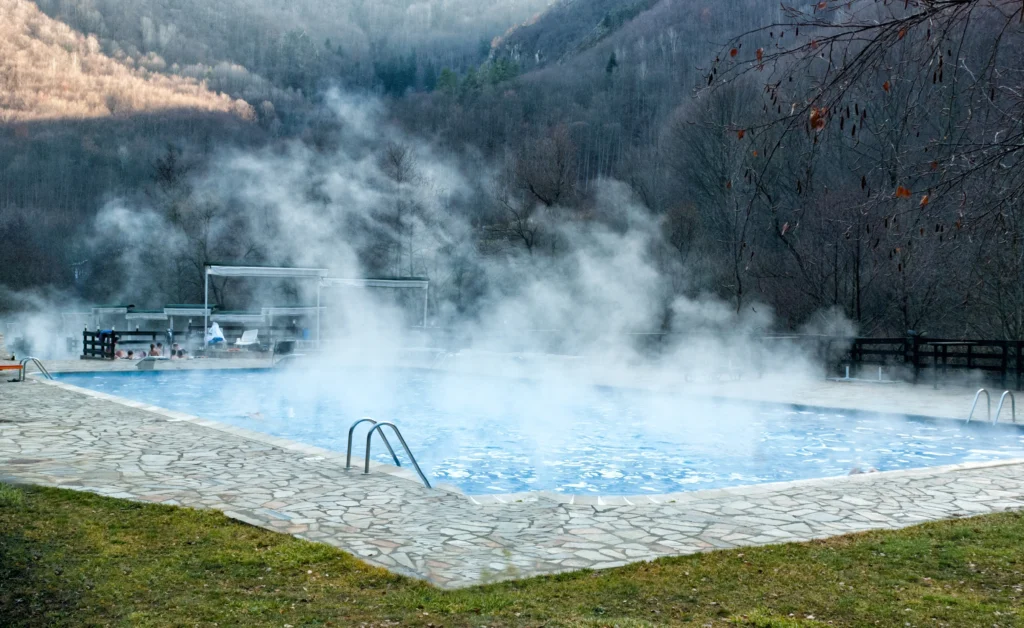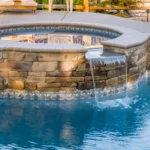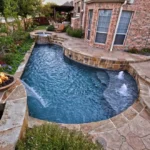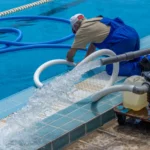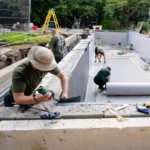Owning a pool in Texas means dealing with the inevitable: pool water evaporation. Whether you have a newly constructed luxury pool or a beautifully resurfaced one, understanding evaporation is essential for effective maintenance. This guide breaks down why pool water evaporates, how to measure it, and what you can do to minimize loss—ultimately saving water, energy, and money.
What Is Pool Water Evaporation?
Pool water evaporation is the process where water from your pool surface turns into vapor due to heat and wind. It’s a natural occurrence, especially during Texas summers, but if left unchecked, it can lead to chemical imbalances, increased water bills, and premature equipment wear.
So, does pool water evaporate? Yes, though the evaporation rate is lower during cooler months, your pool still loses water all year round.
How Much Water Evaporates from a Pool?
One of the most common questions homeowners ask is, “how much water evaporates from a pool?” On average, expect to lose ¼ to ½ inch of water per day due to evaporation. That means a typical backyard pool can lose hundreds of gallons of water every week.
Several factors affect the evaporation rate pool owners experience:
Temperature: Hotter air and water temps increase evaporation.
Humidity: Dry air absorbs more moisture, speeding up the process.
Wind: Strong breezes remove the vapor layer above your pool surface.
Surface Area: Larger pools or free-form pools with wide areas lose more water.
Sun Exposure: Direct sunlight speeds up evaporation significantly.
To help manage this, consider custom pool designs that include shaded areas or integrated water-saving features.
Signs Your Pool is Losing Water
If you’re refilling your pool more often than usual, evaporation might not be the only issue. Here’s how to determine if you’re losing water to evaporation or a potential leak:
Perform a bucket test (leave a water-filled bucket on your pool step and mark both levels after 24 hours).
Check for damp ground around your pool, which may indicate a leak.
Monitor chemical levels—rapid changes may suggest more than just natural evaporation.
If you suspect a leak, contact Rhino Pool Pros for expert leak detection and pool renovations.
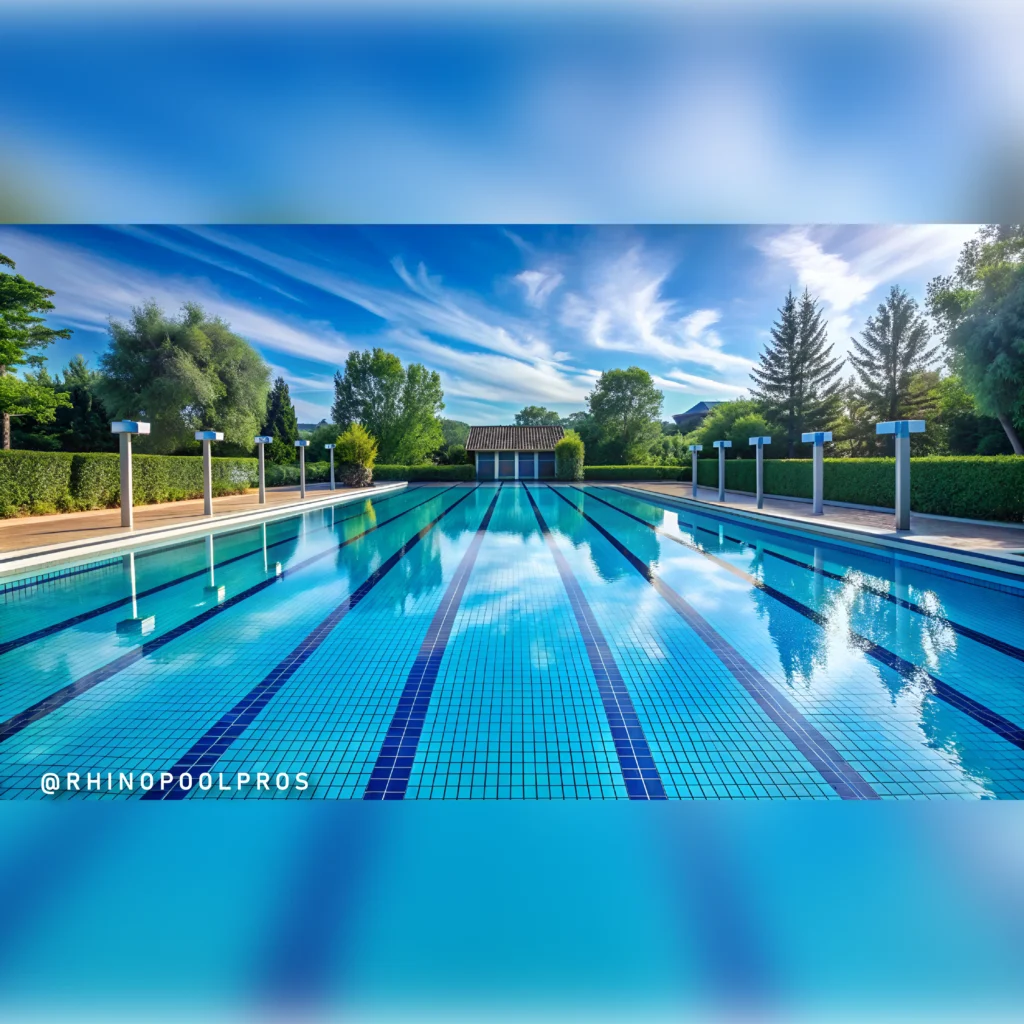
How to Reduce Pool Water Evaporation
Reducing pool water evaporation is not only eco-friendly but also helps preserve your pool’s performance. Here are proven methods to minimize water loss:
Use Pool Evaporation Covers
Pool evaporation covers are one of the most effective tools. These covers form a barrier over the water’s surface, blocking heat and wind while reducing UV exposure. In fact, using a cover can reduce evaporation by up to 95%.
Choose from:
Solar blankets (retain heat while reducing evaporation)
Liquid solar covers (a thin, invisible layer that reduces loss)
Rigid covers (excellent for safety and water retention)
For larger commercial or geometric pools, custom-fitting pool deck resurfacing and cover integration can boost efficiency.
Adjust Water Features
Fountains, waterfalls, and bubblers are beautiful, but they also increase surface agitation, leading to higher evaporation. Consider reducing run times or turning off features during the hottest parts of the day.
Install Windbreaks
Strategic landscaping or privacy screens can block wind and reduce the evaporation rate pool owners typically experience. This also adds aesthetic appeal to your poolside design. Tile and coping upgrades also help seal edges and reduce splash loss.
Monitor Water Chemistry
Evaporation doesn’t just remove water—it concentrates pool chemicals. This imbalance leads to increased maintenance. Use essential pool maintenance tips to maintain water balance and reduce chemical waste.
Shade Your Pool
Adding pergolas, umbrellas, or landscaping helps reduce sun exposure and slows evaporation. For long-term results, consider integrating shade into your new pool construction or outdoor kitchen design.
Why Managing Evaporation Matters
While some evaporation is normal, excessive water loss can lead to:
Higher water bills
Imbalanced pool chemistry
Increased wear on your equipment
Algae growth due to inconsistent sanitization
If you’re frequently refilling your pool, it’s time to take control. You can also contact Rhino Pool Pros for a professional inspection and water-saving upgrade recommendations.
Evaporation Solutions for All Pool Types
Whether you have a residential pool, geometric design, or run a commercial facility, managing pool water evaporation is essential for performance and cost-efficiency.
Our team offers solutions tailored to your specific setup—everything from resurfacing and plaster upgrades to advanced automation that monitors evaporation and water levels in real time.
Final Thoughts
Does pool water evaporate? Absolutely. But you can reduce and manage it with the right knowledge, tools, and guidance.
From installing pool evaporation covers to adjusting water features and chemical levels, proactive steps can make a big difference. Trust Rhino Pool Pros to keep your pool efficient, sustainable, and beautiful year-round.
Looking to upgrade your pool for better water retention and energy savings? Schedule a consultation today and let our experts guide you with customized solutions.

